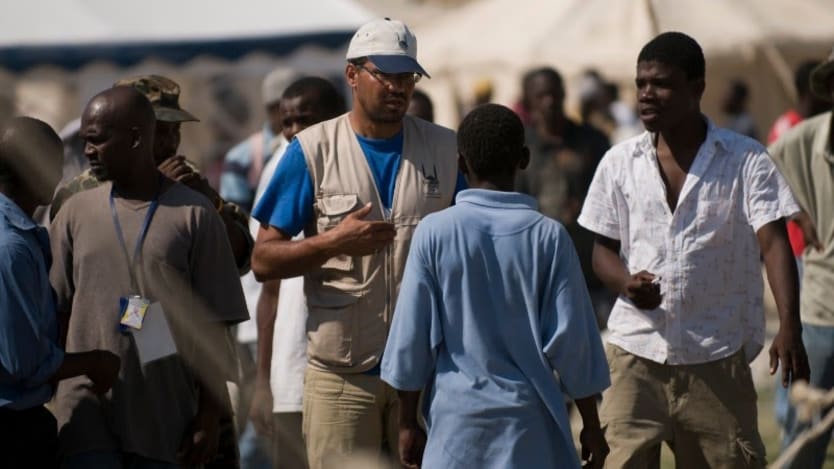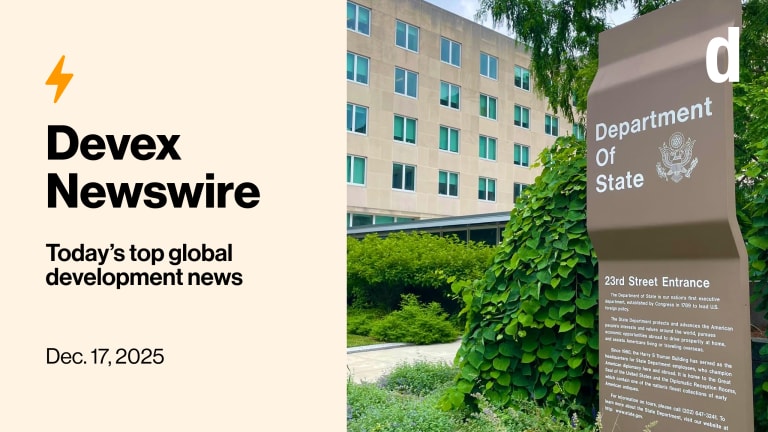
The recent brutal killing of George Floyd, and the wave of demonstrations it has inspired, have shown that the vast majority of us are against racism and discrimination — in theory, at least. In practice, however, that is far from true. As a Black person and a refugee from East Africa, who also happens to be a Muslim, I experience firsthand many forms of discrimination.
It is not a coincidence that I am frequently “randomly selected” and stopped at airports. Nor that I am regularly stopped and searched whilst driving a car, or that I sometimes experience uncomfortable journeys on the London Underground.
But this issue is larger than me. It’s about how in the United Kingdom, and most of Europe, we have made inroads to eradicate prejudice and secure recognition and protections for certain groups, while others have lagged behind. The double stigma of being both Black and Muslim can leave you particularly exposed.
Many refugees have development experience but employers are failing to realize it
Even with the relevant qualifications and experience, refugees can struggle to continue in their global development careers when they resettle in the "global north." Devex finds out why.
What I find especially sad is that, far from going forward, various Muslim communities in the West appear to have regressed.
Since the despicable attacks on Sept. 11, 2001, there has been a rise in Islamophobia and restrictions on freedom of speech that have targeted a significant portion of legitimate, law-abiding, and entirely innocent Muslim groups and institutions. As a community within the wider community, Muslims have too often been left feeling neglected and misunderstood, and unable to defend ourselves. This becomes even more difficult for Muslim women who wear headscarves or niqabs, let alone those who also happen to be Black.
While I am happy to be one of the few Black CEOs of a major aid organization and probably the first Black Muslim CEO, I believe there is something deeply wrong with this ...
—The aid sector and systemic racism
Racial discrimination in the workplace is another major problem that Black people face on a daily basis. In many sectors, including the humanitarian one, there is a systemic racism and inequality problem that we must address to move forward.
One of the reasons this discrimination is reinforced is that the system favors white people over their Black peers by placing them in positions of leadership. Only 3% of chief executives in the aid sector are people of color, and while I am happy to be one of the few Black CEOs of a major aid organization and probably the first Black Muslim CEO, I believe there is something deeply wrong with this figure. We need to change it.
More broadly, aid organizations need to be more diverse by including Black people and those from a BAME [Black and minority ethnic] background at the decision-making table, not only hiring them for junior positions.
I also believe it’s time to rid ourselves of any conception that people in the so-called “developing world” need white saviors. For some, there would appear to be a persistent notion that locals in the global south cannot be trusted to carry out the work themselves, and hence the need for white “ex-pats” to constantly travel overseas. In my experience, this is simply not true. The overwhelming majority of Islamic Relief’s staff overseas are from the local communities they serve, and they demonstrate as much dedication and professionalism as colleagues in other parts of the world.
How to build a successful movement
Part of the solution is better organization. While I’ve seen other minority groups organize effectively and build successful coalitions in the West — for instance, women’s rights campaigners who have made strides in putting gender equality center stage and LGBTQI communities that have likewise made sure but steady progress toward securing their own inalienable rights — the Muslim community, and the Black Muslim community, often seems stuck.
Why has it taken mass protests — sparked by the murder of an unarmed man — for lawmakers to start breaking their silence? Why do things have to get so bad that people are willing to risk their lives by taking to the streets in the middle of a deadly pandemic, which has hit their community especially hard, in order to have a hope that future generations will not need to suffer as they have done?
Now that the spark has been lit, I’ve been encouraged by the diversity of those who have protested against racial discrimination. But this multiracial coalition is largely young. They have the energy and courage, but I fear they don’t have the power or resources to make significant change.
With fears that unemployment levels will soar to levels not seen for decades, we all know which communities are more likely to bounce back and which will likely take decades to recover.
—Changes in development policy, and at home
As a humanitarian worker I’ve seen how, all across the world, the root causes of poverty are inequality and injustice. Aid work that does not address these fundamental issues struggles to bring about change. When talking about foreign and development policy, Western governments live and breathe this mantra. They must realize that the same thing applies at home.
With fears that unemployment levels will soar to levels not seen for decades, we all know which communities are more likely to bounce back and which will likely take decades to recover.
Of course, governments and society at large have a big role to play and must commit to funding and supporting all disadvantaged communities, but it is critical that BAME and Muslim community leaders also step up.
Local volunteers are vital to aid work — but don't always get equal support
Following an attack on two Red Cross volunteers in DRC, Devex hears about the risks and challenges local volunteers face each day, and how international organizations could better support them.
Immigration has been shown to provide widespread economic benefits. In the U.K., immigrants are estimated to be making a net contribution of tens of billions to the economy. According to Citigroup, the same is true in other major economies like Germany and the United States. But once immigrant BAME individuals make it to the top, they all too often seem to forget the struggles they or their parents endured.
A broader coalition needed
To turn the tide and ensure that the fight for equal rights is truly universal — and includes those like the elderly and those with disabilities who cannot take to the streets in the same way — we need to establish a broader coalition dedicated to what I call “true diversity.”
Only this can ensure that we live up to our U.N. Sustainable Development Goal pledge to Leave No One Behind, a commitment by all U.N. member states to support a safer, more prosperous, and equal world by 2030.
In the U.K. and much of Europe, we may not need many more laws on equality and diversity — we have enough to know that all forms of discrimination are undesirable. What we really need is for the standards we do have to be more fairly and equally applied.
If the only thing the protests achieve is to start a conversation, then we will have failed. While it will take decades to attain true social, economic, educational, and political, and health equality, I call on all those who have ever faced discrimination to stand up and fight for the rest of us who have yet to achieve equality. Let’s unite and ensure the unique combination of frustrations about racism, inequality, and COVID-19 inspire us to act as one and truly honor George Floyd’s death.








